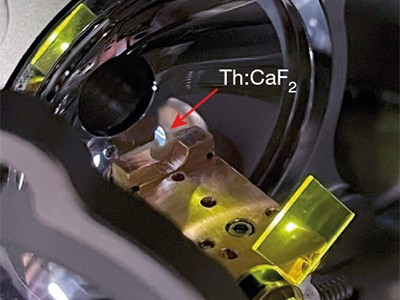Precise timekeeping helps us in our daily lives: from pinpointing your precise location with GPS to synchronising financial deals to the millisecond, and physicists are also seeking ever more accurate measurements of time, as super-accurate clocks could help make planet-sized telescopes, hunt for dark matter or even monitor the shape of the planet from the air.

Read the paper: Frequency ratio of the 229mTh nuclear isomeric transition and the 87Sr atomic clock
So researchers are working on a nuclear clock – a device that would harness the energy levels of the nucleus of an atom to act as a timekeeper.
Now, they’ve got closer than ever, by making extremely accurate measurements of the frequency of light required to push thorium nuclei into a higher energy state – potentially defining the tick of a future nuclear clock.
Subscribe to Nature Briefing, an unmissable daily round-up of science news, opinion and analysis free in your inbox every weekday.






